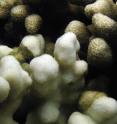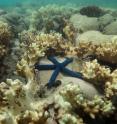Good bacteria vital to coral reef survival
Scientists say good bacteria could be the key to keeping coral healthy, able to withstand the impacts of global warming and to secure the long-term survival of reefs worldwide. "Healthy corals interact with complex communities of beneficial microbes or 'good bacteria'," says Dr. Tracy Ainsworth from the ARC Centre of Excellence for Coral Reef Studies at James Cook University who led the study. "It is very likely that these microorganisms play a pivotal role in the capacity of coral to recover from bouts of bleaching caused by rising temperatures."
"Facilitating coral survival and promoting coral recovery are growing areas of research for coral reef scientists," says co-author Dr. Ruth Gates from Hawai'i Institute of Marine Biology, University of Hawai'i. "To do this we need to explore and understand the bacteria that help keep corals and coral reefs healthy."
Dr. Ainsworth and Dr. Gates have identified new directions for research in understanding coral survival in rapidly changing reef environments.
"We know that lasting changes to the community of beneficial bacteria affects important aspects of the function of host organisms such as humans or corals, including their ability to withstand further stress," says Dr. Ainsworth.
"Corals rely on good bacteria but crucially we don't yet understand these microbes well enough to know how they influence coral survival."
Their latest research has been published in the journal Science, and gives an overview of the current understanding of bacterial communities on corals. It highlights the vital importance of good bacteria to coral health.
The scientists discuss how corals, and coral reefs that survive large-scale changes in the environment over the coming decades, are likely to be very different from those of today.
They say the interaction between corals and good bacteria is crucial to long-term survival.
Their work comes from recent advances in understanding the complexity of the coral's genetic make-up and the unique bacterial communities that corals maintain.
"Preventing physical contact with corals and maintaining high water quality on reefs during stress events will reduce stress loads on corals and creates the best case scenario for survival and recovery," says Dr. Gates.
Source: University of Hawaii at Manoa
Articles on the same topic
- Preparing for a new relationship: Coral and algae interactions exploredThu, 23 Jun 2016, 13:56:20 UTC
- Researchers provide new insights on coral bleachingWed, 22 Jun 2016, 15:13:57 UTC
- 'Coral zombies' may spell doom for coral reefs around worldTue, 21 Jun 2016, 20:05:56 UTC
- Coral reefs facing a hot time and increased bleaching in the US, NOAA outlook saysMon, 20 Jun 2016, 21:33:12 UTC
- Heat sickens corals in global bleaching eventMon, 20 Jun 2016, 21:33:00 UTC
Other sources
- Coral scientists urge Australia to conserve reefs, curb CO2 emissionsfrom CBC: Technology & ScienceMon, 27 Jun 2016, 12:01:16 UTC
- Scientists send coral reef plea to Australiafrom PhysorgSun, 26 Jun 2016, 9:41:11 UTC
- Experts demand more effort to save coral reefsfrom PhysorgSat, 25 Jun 2016, 6:51:13 UTC
- APNewsBreak: Experts demand more effort to save coral reefsfrom AP ScienceSat, 25 Jun 2016, 1:30:58 UTC
- APNewsBreak: Experts say efforts key to saving coral reefsfrom AP ScienceSat, 25 Jun 2016, 1:00:58 UTC
- Good bacteria vital to coral reef survivalfrom Science DailyFri, 24 Jun 2016, 2:51:03 UTC
- Good bacteria vital to coral reef survivalfrom UPIThu, 23 Jun 2016, 20:21:09 UTC
- Good bacteria vital to coral reef survivalfrom PhysorgThu, 23 Jun 2016, 18:21:18 UTC
- [Perspective] Corals' microbial sentinelsfrom Science NOWThu, 23 Jun 2016, 18:01:28 UTC
- Preparing for a new relationship: Coral and algae interactions exploredfrom Science DailyThu, 23 Jun 2016, 14:51:26 UTC
- Preparing for a new relationship: Coral and algae interactions exploredfrom PhysorgThu, 23 Jun 2016, 13:51:15 UTC
- APNewsBreak New technology speeds massive coral reef surveyfrom AP ScienceWed, 22 Jun 2016, 19:01:09 UTC
- Researchers provide new insights on coral bleachingfrom PhysorgWed, 22 Jun 2016, 15:01:10 UTC
- 'Coral zombies' may spell doom for coral reefs around worldfrom Science DailyWed, 22 Jun 2016, 1:11:07 UTC
- 'Coral zombies' may spell doom for coral reefs around worldfrom PhysorgTue, 21 Jun 2016, 21:01:39 UTC
- Current global coral bleaching set to continuefrom PhysorgTue, 21 Jun 2016, 11:01:14 UTC
- Great Barrier Reef bleaching could cost a million touristsfrom PhysorgTue, 21 Jun 2016, 7:01:13 UTC
- Things to know about coral reefs and their importancefrom PhysorgTue, 21 Jun 2016, 6:31:20 UTC
- Global coral bleaching event expected to last through 2016from PhysorgTue, 21 Jun 2016, 5:31:23 UTC
- Coral reefs facing a hot time and increased bleaching, especially along US coastsfrom Science DailyTue, 21 Jun 2016, 0:01:18 UTC
- The Latest: Coral bleaching likely to last through 2016from AP ScienceMon, 20 Jun 2016, 21:31:01 UTC
- Things to know about coral reefs and their importancefrom AP ScienceMon, 20 Jun 2016, 21:31:01 UTC
- Global coral bleaching event expected to last through 2016from AP ScienceMon, 20 Jun 2016, 21:30:59 UTC
- Heat sickens corals in global bleaching eventfrom Science DailyMon, 20 Jun 2016, 16:31:38 UTC
- Heat sickens corals in global bleaching eventfrom PhysorgMon, 20 Jun 2016, 16:01:35 UTC
- Scientists battle to save world's coral reefsfrom PhysorgMon, 20 Jun 2016, 7:31:00 UTC
- Scientists battle to save world's coral reefsfrom AP ScienceMon, 20 Jun 2016, 7:01:19 UTC
- What are coral reefs and why are they importantfrom AP ScienceSun, 19 Jun 2016, 17:50:58 UTC
- Scientists battle to save world's coral reefsfrom AP ScienceSun, 19 Jun 2016, 16:51:00 UTC

